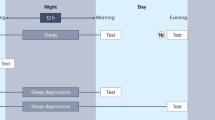Abstract
The literature concerning the relationship of rapid eye movement sleep to cognitive activity in general and retention in particular is reviewed. Evidence from studies using animals and humans as Ss is included. No firm conclusions can be reached because of the lack of research in some aspects of the problems and because of methodological inadequacies in much of the research, but con-siderable evidence is at least consistent with the idea that rapid eye movement sleep is involved in long-term retention. A state-dependent learning hypothesis which accounts for some of the results is considered. Suggestions for future work in this area are included.
Similar content being viewed by others
References
ALBERT, I., CICALA, G. A., & SIEGEL, J. 1970. The behavioral effects of Rem sleep deprivation in rats. Psychophysiology, 6, 550–560.
ASERINSKY, E., & KLEITMAN, N. 1953. Regularly occuring periods of eye motility and concomitant phenomena during sleep. Science, 118, 273–274.
BAEKELAND, F., & LASKY, R. 1968. The morning recall of rapid eye movement period reports given earlier in the night. Journal of Nervous and Mental Disease, 147, 570–579.
BARKER, R. A. 1971. The effect of Rem on recall of a visual task. Unpublished Masters Thesis, University of Illinois at Chicago Circle.
BRILL, R. W., Jr., & GOODMAN, I. J. 1969. Effects of Rem sleep deprivation on memory in cats. Paper read at Association for the Psychophysiological Study of Sleep meeting.
COHEN, H., & DEMENT, W. 1966. Sleep: Suppression of rapid eye movement phase in the cat after electroconvulsive shock. Science, 154, 396–398.
COHEN, H., DUNCAN, R. F., & DEMENT, W. 1967. Sleep: The effect of electro-convulsive shock in cats deprived of Rem sleep. Science, 156, 1646–1648.
EKSTRAND, B. 1967. Effect of sleep on memory. Journal of Experimental Psychology, 75, 64–72.
EKSTRAND, B., SULLIVAN, M. J., PARKER, D. F., & WEST, J. N. 1971. Spontaneous recovery and sleep. Journal of Experimental Psychology, 88, 142–144.
EMPSON, J. A., & CLARKE, P. R. 1970. Rapid eye movements and remembering. Nature, 227, 287–288.
FEINBERG, I., 1968 Eye movement activity during sleep and intellectual function in mental retardates. Science, 159, 1256.
FEINBERG, I., BRAUN, M., & SHULMAN, E. V. 1967. Electrophysiological sleep patterns in mental retardation. Paper read at First Congress of the International Association for the Scientific Study of Mental Retardation, France.
FELDMAN, R. 1970. The effect of deprivation of rapid eye movement sleep on learning and retention in humans. Ph.D. Dissertation, Stanford University.
FISHBEIN, W., TUSA, R. J., & McGAUGH, J. L. 1970. The effects of Rem sleep deprivation during the retention interval on long-term memory of a discrimination task. Paper read at Association for the Psychophysiological Study of Sleep meeting.
GLICKMAN, S. E. 1961. Perserverative neural processes and consolidation of the memory trace. Psychological Bulletin, 58, 218–233.
GREENBERG, R., & DEWAN, E. M. 1969. Aphasia and rapid eye movement sleep. Nature, 223, 183–184.
JENKINS, J. G., & DALLENBACH, K. M. 1924. Obliviscence during sleep and waking. American Journal of Psychology, 35, 605–612.
J, R. M., & PRINZ, P. N. 1967. Chronic postural restriction in the rat: Its effect upon sleep patterns and the acquisition and retention of a conditioned avoidance response. Proceedings of the West Pharmacological Society, 10, 50.
KAMIN, L. J. 1957. Retention of an incompletely learned avoidance response. Journal of Comparative and Physiological Psychology, 50, 457–460.
KOUKKOU, M., & LEHMANN, D. 1968. EEG and memory storage in sleep ex-periments with humans. Electroencephalography and Clinical Neurophysiology, 25, 455–462.
LECONTE, P., & BLOCH, V. 1970. Effect of paradoxical sleep deprivation on the acquisition and retention of conditioning in rats. Journal of Physiology (Paris), 62, 290.
LING, G. M., & USHER, D. R. 1969. Ejfect of Rem and total sleep deprivation on the synthesis and release of Acth. Paper read at Association for the Psychophysiological Study of Sleep meeting.
LOVATT, D. J., & WARR, P. B. 1968. Recall after sleep. American Journal of Psychology, 81, 253–257.
MUZIO, J., ROFFWARG, H., ANDERS, C., & MUZIO, L. 1971. Retention of rote-learned meaningful verbal material and alterations in the normal sleep Eeg patterns. Paper read at Association for the Psychophysiological Study of Sleep meeting.
OVERTON, D. A. 1968. Dissociated learning in drug states (state dependent learning). In D. H. Efron (Ed.), Psychopharmacology: A review of progress 1957–1967. Washington: Public Health Service Publication No. 1836.
PEARLMAN, C. A. 1969. Effect of rapid eye movement (dreaming) sleep deprivation on retention of avoidance learning in rats. Report No. 563. U. S. Naval Submarine Medical Center.
PETRE-QUADENS, O., & DELEE, C. 1970. Eye movements during sleep: A common criterion of learning capacities and endocrine activity. Developmental Medicine and Child Neurology, 12, 730–740.
PORTNOFF, G., BAEKELAND, F., GOODENOUGH, D. R., KARACAN, I., & SHAPIRO, A. 1966. Retention of verbal materials perceived immediately prior to onset of non-Rem sleep. Perceptual and Motor Skills, 22, 751–758.
RICHARDSON, A., & GOUGH, J. E. 1963. The long range effect of sleep on retention. Austrailian Journal of Psychology, 15, 37–41.
STERN, W. C. 1969(a). Effects of Rem sleep deprivation upon acquisition and maintenance of learned behavior in the rat. Paper read at Association for the Psychophysiological Study of Sleep meeting.
STERN, W. C. 1969(b). Stress effects of Rem sleep deprivation in rats: Adrenal gland hypertrophy. Paper read at Association for the Psychophysiological Study of Sleep meeting.
STERN, W. C. 1970. The relationship between Rem sleep and learning: Animal studies. International Psychiatry Clinics, 7, 249–257.
VANORMER, E. B. 1932. Retention after intervals of sleep and waking. Archives of Psychology, 21, No. 137.
WOODWORTH, R. S., & SCHLOSBERG, H. 1954. Experimenal Psychology. New York: Holt, Rinehart & Winston.
Author information
Authors and Affiliations
Rights and permissions
About this article
Cite this article
Stokes, J.P. The Effects of Rapid Eye Movement Sleep on Retention. Psychol Rec 23, 521–531 (1973). https://doi.org/10.1007/BF03394200
Published:
Issue Date:
DOI: https://doi.org/10.1007/BF03394200




